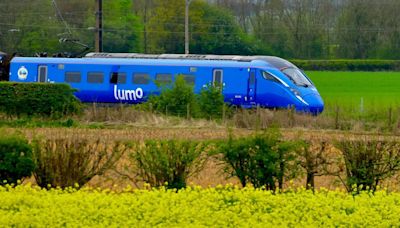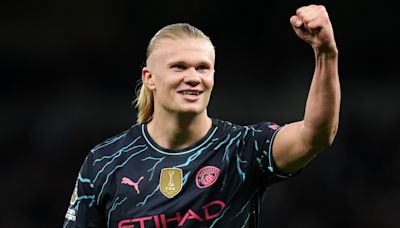Search results
- The name “Manchester” has its roots in ancient history and comes from a combination of Old English and Latin elements. The city’s name is thought to have evolved over centuries, reflecting the various cultures and languages that have influenced the region.
theculturetrip.com › europe › united-kingdom
People also ask
Why is Manchester called Manchester?
How did Manchester City FC get its name?
Is Manchester City a football club?
Who founded Manchester City Football Club?
Manchester City Football Club (commonly referred to as simply Manchester City or Man City) is a professional football club based in Manchester, England, that competes in the Premier League, the top flight of English football.
- Overview
- Founding and early history
- 2008 financial takeover
Manchester City FC, English men’s professional football (soccer) club based in Manchester. Manchester City achieved consistent top-division success and claimed multiple titles after Sheikh Mansour ibn Zayed Al Nahyan purchased a controlling share in the club in 2008.
Manchester City traces its history to a football team founded in 1880 by members of St. Mark’s Church in Manchester. That team became Ardwick Association Football Club in 1887 and Manchester City Football Club (FC) in 1894. From 1894 to 2008 the club moved among the upper tiers of English football, regularly suffering relegation and winning promotion. It was champion of football’s second tier seven times, and it won the Football League First Division championship twice (in the 1936–37 and 1967–68 seasons). Manchester City also won the Football Association Challenge Cup (FA Cup) four times (1903–04, 1933–34, 1955–56, and 1968–69), the English League Cup twice (1969–70 and 1975–76), and the European Cup Winners’ Cup once (1969–70). Notable players from this era include Bert Trautmann, who was goalkeeper for Manchester City from 1949 to 1964, and midfielders Alan Oakes (played 1959–76) and Colin Bell (played 1966–79).
After winning back-to-back promotions following the 1998–99 and 1999–2000 seasons that enabled the club to ascend to English football’s top-tier English Premier League, Manchester City was once again relegated to the sport’s second tier after their lacklustre 2000–01 season. The club returned to the Premier League in 2002, however, and has remained there. In 2003 Manchester City moved from Maine Road, the stadium where it had played since 1923, to the City of Manchester Stadium (later also called Etihad Stadium).
The Abu Dhabi United Group, owned by Sheikh Mansour ibn Zayed Al Nahyan, purchased a controlling stake in Manchester City FC in 2008 from Thaksin Shinawatra, a former prime minister of Thailand who had bought into the club in 2007. Mansour, a senior member of Abu Dhabi’s ruling family and one of the foremost businessmen of the United Arab Emirates, invested heavily, and the team’s performance soon improved. Manchester City won the FA Cup in 2011, its first major trophy since Mansour’s takeover. On the last day of the 2011–12 Premier League season, the team snatched the league title away from Manchester United on goal difference with the help of a stoppage time goal by Sergio Agüero against Queens Park Rangers FC. They won the Premier League again in 2013–14 and the English League Cup in 2013–14 and 2015–16.
After the appointment of manager Pep Guardiola in 2016, Manchester City expanded on their success. After a trophyless first season, the club set the all-time Premier League points record with 100 points as well as single-season Premier League records for goals scored and goal differential, among others, during their title-winning 2017–18 season. They repeated in 2018–19 and won the Premier League title again in 2020–21 and 2021–22. Manchester City won the FA Cup in 2018–19. The club was also the League Cup winner in 2017–18, 2018–19, 2019–20, and 2020–21. Manchester City reached the Champions League Final for the first time in its history during the 2020–21 season, though they lost to Chelsea FC; the club won the Champions League title in 2022–23. In 2021 Manchester City was the first club to withdraw from a controversial plan to form a new European Super League. Notable players who joined Manchester City in 2008 and afterward are centre back Vincent Kompany, midfielders Yaya Touré, David Silva, and Kevin De Bruyne, and forward Sergio Agüero.
The Manchester City Women’s Football Club was founded in 1988. Affiliated with Manchester United FC from its creation, the women’s team formalized its partnership with the men’s team in 2012 and entered the Women’s Super League in 2013.
Special offer for students! Check out our special academic rate and excel this spring semester!
Members of St. Mark's Church of England, West Gorton, Manchester, founded the football club that would become known as Manchester City for largely humanitarian purposes.
Jul 24, 2023 · Published: July 24, 2023. Reading time: 4 min. The Curious Development of the Name Manchester. When we think of Manchester, we likely picture our lively English city known for its fascinating history, vibrant modern culture, and significant contribution to music, arts, and sports. You could say, we’re pretty famous.
Oct 22, 2022 · 1 A Brief History. 2 Why are there 2 football teams in Manchester? 3 Why are Manchester United and Manchester City rivals? 4 Conclusion. A Brief History. Manchester is one of England’s great cities imbibed with a rich history and culture.
The name Manchester originates from the Latin name Mamucium or its variant Mancunio. These names are generally thought to represent a Latinisation of an original Brittonic name. The generally accepted etymology of this name is that it comes from Brittonic * mamm- ("breast", in reference to a "breast-like hill").





